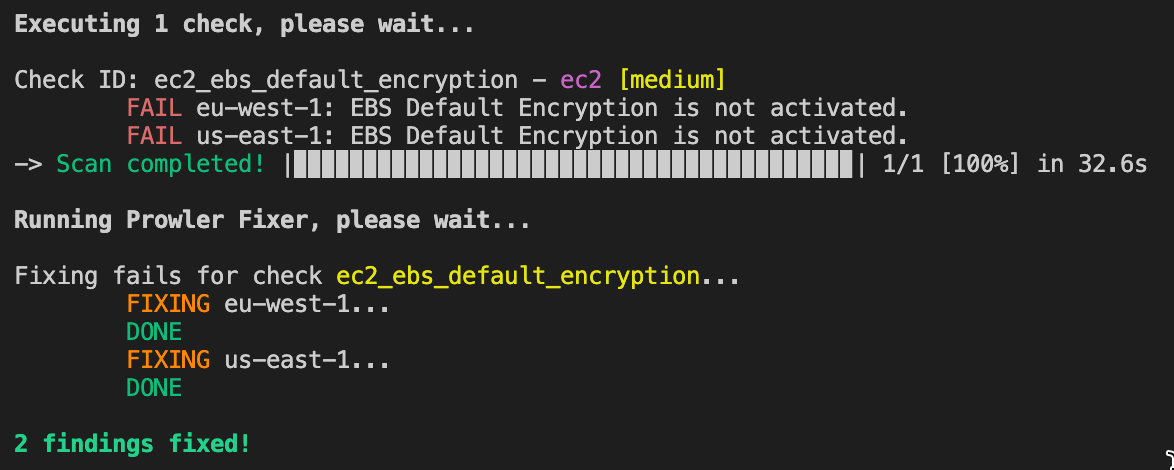Prowler Fixer¶
Prowler allows you to fix some of the failed findings it identifies. You can use the --fixer flag to run the fixes that are available for the checks that failed.

Note
You can see all the available fixes for each provider with the --list-fixers flag.
Writing a Fixer¶
To write a fixer, you need to create a file called <check_id>_fixer.py inside the check folder, with a function called fixer that receives either the region or the resource to be fixed as a parameter, and returns a boolean value indicating if the fix was successful or not.
For example, the regional fixer for the ec2_ebs_default_encryption check, which enables EBS encryption by default in a region, would look like this:
from prowler.lib.logger import logger
from prowler.providers.aws.services.ec2.ec2_client import ec2_client
def fixer(region):
"""
Enable EBS encryption by default in a region. NOTE: Custom KMS keys for EBS Default Encryption may be overwritten.
Requires the ec2:EnableEbsEncryptionByDefault permission:
{
"Version": "2012-10-17",
"Statement": [
{
"Effect": "Allow",
"Action": "ec2:EnableEbsEncryptionByDefault",
"Resource": "*"
}
]
}
Args:
region (str): AWS region
Returns:
bool: True if EBS encryption by default is enabled, False otherwise
"""
try:
regional_client = ec2_client.regional_clients[region]
return regional_client.enable_ebs_encryption_by_default()[
"EbsEncryptionByDefault"
]
except Exception as error:
logger.error(
f"{region} -- {error.__class__.__name__}[{error.__traceback__.tb_lineno}]: {error}"
)
return False
s3_account_level_public_access_blocks check, which enables the account-level public access blocks for S3, would look like this:
from prowler.lib.logger import logger
from prowler.providers.aws.services.s3.s3control_client import s3control_client
def fixer(resource_id: str) -> bool:
"""
Enable S3 Block Public Access for the account. NOTE: By blocking all S3 public access you may break public S3 buckets.
Requires the s3:PutAccountPublicAccessBlock permission:
{
"Version": "2012-10-17",
"Statement": [
{
"Effect": "Allow",
"Action": "s3:PutAccountPublicAccessBlock",
"Resource": "*"
}
]
}
Returns:
bool: True if S3 Block Public Access is enabled, False otherwise
"""
try:
s3control_client.client.put_public_access_block(
AccountId=resource_id,
PublicAccessBlockConfiguration={
"BlockPublicAcls": True,
"IgnorePublicAcls": True,
"BlockPublicPolicy": True,
"RestrictPublicBuckets": True,
},
)
except Exception as error:
logger.error(
f"{error.__class__.__name__}[{error.__traceback__.tb_lineno}]: {error}"
)
return False
else:
return True
Fixer Config file¶
For some fixers, you can have configurable parameters depending on your use case. You can either use the default config file in prowler/config/fixer_config.yaml or create a custom config file and pass it to the fixer with the --fixer-config flag. The config file should be a YAML file with the following structure:
# Fixer configuration file
aws:
# ec2_ebs_default_encryption
# No configuration needed for this check
# s3_account_level_public_access_blocks
# No configuration needed for this check
# iam_password_policy_* checks:
iam_password_policy:
MinimumPasswordLength: 14
RequireSymbols: True
RequireNumbers: True
RequireUppercaseCharacters: True
RequireLowercaseCharacters: True
AllowUsersToChangePassword: True
MaxPasswordAge: 90
PasswordReusePrevention: 24
HardExpiry: False
# accessanalyzer_enabled
accessanalyzer_enabled:
AnalyzerName: "DefaultAnalyzer"
AnalyzerType: "ACCOUNT_UNUSED_ACCESS"
# guardduty_is_enabled
# No configuration needed for this check
# securityhub_enabled
securityhub_enabled:
EnableDefaultStandards: True
# cloudtrail_multi_region_enabled
cloudtrail_multi_region_enabled:
TrailName: "DefaultTrail"
S3BucketName: "my-cloudtrail-bucket"
IsMultiRegionTrail: True
EnableLogFileValidation: True
# CloudWatchLogsLogGroupArn: "arn:aws:logs:us-east-1:123456789012:log-group:my-cloudtrail-log-group"
# CloudWatchLogsRoleArn: "arn:aws:iam::123456789012:role/my-cloudtrail-role"
# KmsKeyId: "arn:aws:kms:us-east-1:123456789012:key/1234abcd-12ab-34cd-56ef-1234567890ab"
# kms_cmk_rotation_enabled
# No configuration needed for this check
# ec2_ebs_snapshot_account_block_public_access
ec2_ebs_snapshot_account_block_public_access:
State: "block-all-sharing"
# ec2_instance_account_imdsv2_enabled
# No configuration needed for this check